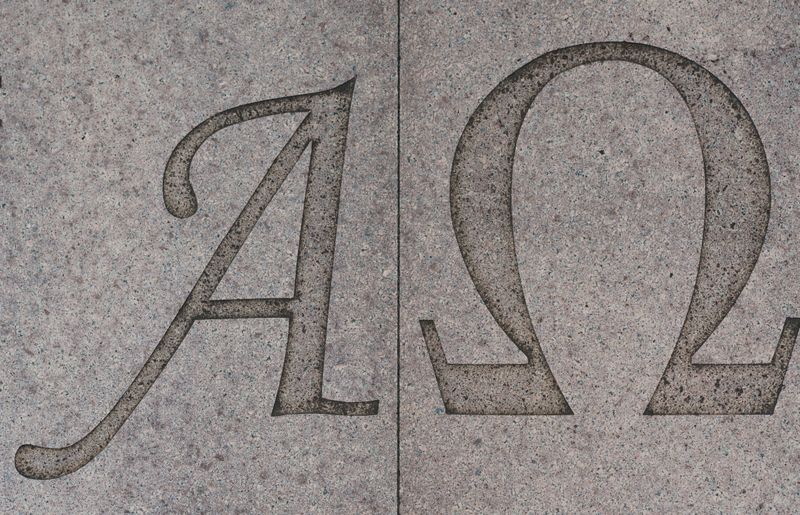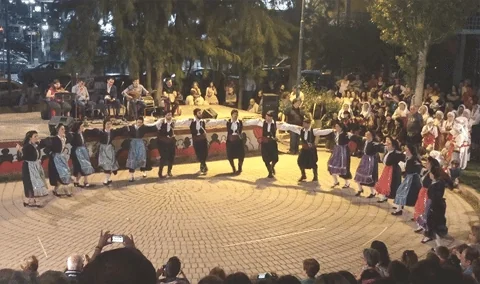So, you’ve watched My Big Fat Greek Wedding (twice), tried yelling “Opa!” while breaking a plate (hopefully on purpose), danced a few clumsy steps of syrtaki after two glasses of ouzo, and now you’re wondering…should I actually learn Greek?

Yes. Yes, you should!
Because Greek isn’t just the language of philosophers and democracy. It’s the official soundtrack of sun-soaked island hopping, feta-fueled feasts, and family members who say everything louder and with more hand gestures.
Imagine ordering moussaka in Athens without pointing awkwardly at the menu. Or impressing locals in Santorini by saying “Kaliméra!” instead of “Hello?” with a hopeful smile. Or finally understanding what Aunt Voula was yelling about in that movie.
Why Learn Greek?
Spoken primarily in Greece and Cyprus, Greek is an Indo-European language with one of the longest histories, spanning more than 3,400 years. There are many reasons to learn Greek, regardless of whether you have Greek heritage or not.
 Photo by Constantinos Kollias on Unsplash
Photo by Constantinos Kollias on Unsplash1. Travel Like a Local
Knowing a little Greek improves your journey, whether you're visiting Athens or the islands. You'll ask for directions, order food, and navigate with confidence since locals value the effort.
2. Build Stronger Connections
Language is connection. Speaking Greek demonstrates respect, curiosity, and openness, whether you're getting in touch with your roots, meeting new Greek friends, working with Greek coworkers, or falling for someone from the land of Zeus.
3. Unlock History and Mythology
Admire Greek mythology? Are you fascinated by ancient ruins? You may access the original language of Aristotle, Plato, and Homer in Greek. It makes classic tales and concepts easier to understand.
4. Improve Your Brain and Language Skills
Greek is logical and phonetic — it improves memory and focus. Many English words have Greek roots (photography, theatre, etc.). Therefore, you'll understand your own language better as well.
Greek Alphabet Basics (Meet the Letters)
Greek uses a different script than English, but it's not as scary as it seems. Actually, you'll recognize a lot of Greek letters.
Why? Because the Latin alphabet, which is used in English, and the Cyrillic script, which is used in Russian and other Slavic languages, both sprang from the Greek alphabet.
The Greek alphabet consists of 24 letters, each with its own unique sound and name.
 Photo by Declan Sun on Unsplash
Photo by Declan Sun on UnsplashGreek Letter > Name & Approximate Pronunciation
Α α > Alpha “a” as in father
Β β > Beta “v” as in very
Γ γ > Gamma “y” as in yes
Δ δ > Delta “th” as in this
Ε ε > Epsilon “e” as in met
Ζ ζ > Zeta “z” as in zebra
Η η > Eta “ee” as in meet
Θ θ > Theta “th” as in think
Ι ι > Iota “ee” as in machine
Κ κ > Kappa “k” as in kite
Λ λ > Lambda “l” as in love
Μ μ > Mu “m” as in man
Ν ν > Nu “n” as in nice
Ξ ξ > Xi “x” as in fox
Ο ο > Omicron “o” as in pot
Π π > Pi “p” as in pet
Ρ ρ > Rho “r” as in run
Σ σ/ς > Sigma “s” as in sun
Τ τ > Tau “t” as in top
Υ υ > Upsilon “ee”
Φ φ >Phi “f” as in fun
Χ χ > Chi hard “h” or “kh” sound
Ψ ψ > Psi “ps” as in upset
Ω ω > Omega long “o” as in tone
Check out this video to learn more about the Greek alphabet and hear how the letters are pronounced!
How Greek Sounds: Pronunciation Basics
The majority of Greek pronunciation is phonetic, meaning that what you see is what you pronounce, making it surprisingly learner-friendly. Reading Greek is significantly simpler than reading English once you understand the phonemes.

Diphthongs: Two Letters, One Sound
Vowel combinations that combine to form a single sound are known as diphthongs. They are widespread and simple to adjust to with experience. Here's a useful graph:
Diphthong > Example & Pronunciation
αι “e” as in let > και (and) keh
ει “ee” as in see > είμαι (I am) ee-meh
οι “ee” as in see > όλοι (all) ó-lee
υι “ee” (rare) > υιός (son/formal) ee-ós
ου “oo” as in moon > που (where/that) poo
αυ “av” or “af” depending > αυτό (this) af-tó
ευ “ev” or “ef” depending > ευχαριστώ (thanks) ef-cha-ree-stó
Accent Marks Are Your Guide
Every Greek word with more than one syllable has one accent mark (´) which tells you which syllable to stress and yes, it matters.
Examples
μάθημα = MA-thi-ma (lesson)
σχολείο = sko-LEE-o (school)
καλημέρα = ka-lee-ME-ra (good morning)
νερό = ne-RO (water)
γυναίκα = yee-NE-ka (woman)
Digraphs: Two Letters, One Consonant Sound
Consonant pairs that combine to form a single sound are known as digraphs. These are necessary for proper Greek spelling and reading. Take a look at the following table:
Digraph > Example & Pronunciation
μπ “b” as in boy > μπαμπάς (dad) ba-bas
ντ “d” as in dog > ντομάτα (tomato) do-ma-ta
γκ “g” as in go > γκρι (gray) gkree
τσ “ch” as in cheese > τσάι (tea) chai
τζ “j” as in jungle > τζατζίκι (tzatziki) ja-jee-kee
Greetings & Essential Phrases
Learning a few basic Greek phrases can help you explore an island, speak with locals, or just order souvlaki without looking like a tourist.
Let's go over the fundamentals and see how they apply.

Essentials
Phrase & Pronunciation > Meaning
Ευχαριστώ (Ef-cha-ree-STO) > Thank you
Παρακαλώ (Pa-ra-ka-LO) > Please/You're welcome
Συγγνώμη (See-GNO-mee) > Sorry/Excuse me
Ναι (Neh) > Yes
Όχι (O-hee) > No
Εντάξει (En-DAK-see) > OK / All right
Δεν καταλαβαίνω (Then ka-ta-la-VE-no) > I don’t understand
Μιλάτε αγγλικά (Mee-LA-te ang-lee-KA?) > Do you speak English?
Greetings
Phrase & Pronunciation > Meaning
Γειά σου (Ya soo) > Hello/Bye (informal)
Γειά σας (Ya sas) > Hello/Bye (formal or plural)
Καλημέρα (Ka-lee-ME-ra) > Good morning
Καλησπέρα (Ka-lees-PE-ra) > Good evening
Καληνύχτα (Ka-lee-NEEK-ta) > Good night
Αντίο (An-DEE-o) > Goodbye (more final, formal)
Χαίρετε (HE-re-te) > Greetings/Hello (formal or polite)
Τα λέμε (Ta LE-me) > See you/Talk soon
Take a look at the video below to learn more everyday Greek phrases in action!
Quiz
What does "Καλησπέρα" mean?
Tips for Learning and Using Basic Greek Phrases
Practice out loud. The more you speak Greek, even to yourself, the more easily you can pronounce it.
Use “Γεια” everywhere. Your best pal is "Γεια." Very useful in any circumstance, it can be used to say both hello and goodbye.
Listen & repeat. When you hear locals speak, try to mimic their tone and rhythm. Treat it like a song, Greek is musical!
Don’t stress about the grammar yet. Just focus on memorizing full expressions. You’ll learn the grammar later. Right now, communication is the goal.
Mistakes are normal. In general, Greeks are kind and patient. If you attempt, they'll usually smile and assist, even if you make a mistake!

Take Action
It's time to practice speaking Greek now that you know the basics, including how it sounds, how to greet people, and how to be kind. Your confidence will increase with each word you say — you don't have to speak perfectly.
What You Can Do Next:
Your feedback matters to us.
This Byte helped me better understand the topic.

